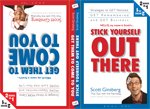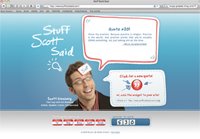 Have you ever been SO hungry that you actually considered cannibalism?
Have you ever been SO hungry that you actually considered cannibalism?
Me neither. I was just curious.
Still, hunger IS a powerful, instinctive force. Maybe it has something to do with our hunter-gatherer nature. I mean, hell, people kill each other for food.
In fact, I could probably cite at least twenty occasions when I was a kid – if the proper weaponry were available – I definitely would have decapitated my big brother just to get dibs on that last slice of pizza.
But enough about Hebrew School.
Instead, here are three questions I want you to think about:
1. Who’s hungry for YOU?
2. How many customers are ravenous and drooling for a bite of YOUR expertise?
3. And what are you doing on a daily basis to grow (and eventually satisfy) their hunger?
Today I’m going to share a nine strategies that you can implement to create an ongoing, market-wide hunger … for YOU.
And I promise not to make any more cannibalism or decapitation jokes.
Well, maybe just one.
So, Jeffrey Dahmer walks into a bar…
Anyway.
1. Attach more promise to your name. Brands are expectations. Which means it’s your job to prove customers right. To confirm their expectations about the value you deliver and the values you stand for. So, let’s do a three-part exercise.
FIRST: Consider five businesses you patronize regularly. What respective promises are attached to each of their names? Write them down.
SECOND: Consider your own business. What is the promise your customers keep coming back for? Write it down.
THIRD: Brainstorm ten specific actions you can take in the next 72 hours to exponentially attach MORE of that promise to your name. Write ’em down.
Remember: To promise to show signs of future excellence. To grow the hunger for YOU, ask: How predictable are you?
2. Competence is assumed. First, good was good enough. Then great was good enough. Now, great isn’t that great anymore. People demand WOW. So: You need to be amazing. Like, scary good. Everything else is your ante. The price of admission.
My suggestion is to stop doing something unless you’re amazing. As Seth Godin once said, “Average is for losers. Be exceptional or quit.” To grow the hunger for YOU, ask: What are you the World Heavyweight Champion of?
3. Be The Answer. People go to Google for one reason: Pornography. But AFTER pornography, people go to Google to solve problems. That’s the secret: Being The Answer. So, here’s an equation that you can plug your unique value (and your perfect customers) into. It’s called The Ultimate Dream Statement, and it goes a little like this:
“I wish there was a/an (X) so I wouldn’t have to (Y).”
So, the (X) in the equation is dream focused, solution oriented and optimistic, i.e., “A portable music player with unlimited digital shelf space.” Then, the (Y) in the equation takes away pain by helping people save time, money, energy, paper or manpower, i.e., “Schlepping ten years of CD’s around my apartment.”
That’s being The Answer: Figuring out what your customers are SICK of doing, then positioning your expertise as the key to NEVER doing that again. To grow the hunger for YOU, ask: What do your customers wish they didn’t HAVE to do anymore?
4. Don’t be selfish with your knowledge. Share your expertise generously so people recognize it, embrace it and eventually depend on you for it. Soon, people in your marketplace will start coming to your for your time. Because they’ll think, “If I’m getting this much help for FREE from this person, how much better off would I be if I actually hired him?”
Remember: More content = More findable = More addictable = More bookable. To grow the hunger for YOU, ask: What did you write today?
5. Create a Visibility Plan. Not a Marketing Plan. Not a Business Plan. A Visibility Plan. Do you have one of those? Doubtful. Most people don’t. And they’re losing money every day for a simple reason: You can no longer afford to be invisible. Winking in the dark is NOT a smart business strategy.
I invite you to sit down with your team and write out all the potential venues – online and off – that increase your visibility. Then spend the next hour doubling that number. The mere exercise of doing so is eye opening and will change your attitude toward marketing forever.
Remember: Being known as “The Best Kept Secret” is a one-way ticket to Sucksville. If you’re a secret, you can’t possibly be the best. Period. Be public or be penniless. To grow the hunger for YOU, ask: What’s your visibility plan?
6. Identify the ONE niche you can overwhelm. Bore deeply into sector needs and position yourself as THEE Guy. The Only. The Universally Presumed Perpetrator. A fixture in the industry. Better than anyone else in your space. So distinct that you’re perceived as a monopoly and people starting asking and hearing what you might say about their situation.
Ultimately, someone who invariably winds up on people’s doorsteps. That way, when customers come, you can confidently declare, “You haven’t just come to the right place – you’ve come to the ONLY place!”
Remember: People will remember your stance if it’s unexpected and non-template driven. To grow the hunger for YOU, ask: To whom will you be known as a rock star?
7. Get them to sample your wares. Everybody knows the best day to go to the supermarket is Saturday. Why? Sample day. And if you do it right – for example, eat a few samples, go out to your car, change your shirt, then walk back in – you can make an entire meal out of those babies!
Now, when you’re a kid you don’t recognize the power of this strategy. Because by giving out those samples, the store feeds your hunger. And that’s why it’s no surprise that Saturdays tend to be the highest grossing days in the grocery world.
So, my question for you is: How many samples do YOU have out there? How often are you giving your samples away? And how much more money would you be making if you designed a system that fed people’s hunger for YOU on a daily basis?
Here’s a hint: Blogging works. Tweeting works. Ezines work. The secret is value. The secret is free. To grow the hunger for YOU, ask: What’s your sample strategy?
8. Be seen in your element regularly. People need to see you doing what you do. Those moments when you’re in your element. At your best, flowing like Phelps. Delivering your unique value in your unique way. The secret is to capture it digitally and share it with the world by starting what I call a Value Forward Video Campaign.
For example, as a professional speaker, I collect video footage from my presentations and workshops. And what I’ll do is break down the program into four or five smaller modules, each of which is edited with a consistent intro and outro. Then I’ll post one clip every Friday for a month, linking back to it from my blog, ezine, Twitter and Facebook accounts.
Ultimately, thousands of people watch them and dozens of people hire me because of them. All because they portray me at my best, doing what I do, delivering unique value to others.To grow the hunger for YOU, ask: How often are customers seeing you in YOUR element?
9. Start positive rumors about yourself. Oscar Wilde once remarked, “The only thing worse than being talked about is NOT being talked about.” So, here’s the question: Who’s talking about YOU? Answer: Not enough people. So, here’s my suggestion: Do it yourself. It’s heaps of fun.
In fact, National Start a Rumor Day is November 9th. Consider posting a blog with five pieces of personal information about yourself, one of which ISN’T true. Next, challenge your readers to guess which one is the lie. Then reveal the answer a week later. Maybe even award the first correct answer with a small gift.
What do you have to lose? That’s probably more creative and engaging than most of the 120,000 blogs that are posted each day. To grow the hunger for YOU, ask: How many positive rumors are floating around regarding YOUR value?
DON’T FORGET: If you want to build the brand OF you, start by growing the hunger FOR you.
Now if you’ll excuse me, my big brother is coming over for pizza.
LET ME ASK YA THIS…
What deliciousness are you delivering?
LET ME SUGGEST THIS…
For the list called, “72 Ways to Take Your Blog from Anonymous to Award-Winning,” send an email to me, and I’ll send you the list for free!
* * * *
Scott Ginsberg
That Guy with the Nametag
Author, Speaker, Coach, Entrepreneur
[email protected]
 Need to build your Thought Leadership Platform?
Need to build your Thought Leadership Platform?
Perhaps my monthly (or yearly) coaching program would help.
Rent Scott’s Brain today!

 Five words that will change your business forever:
Five words that will change your business forever: “Why doesn’t anybody follow me on Twitter? This sucks!”
“Why doesn’t anybody follow me on Twitter? This sucks!”
 The world’s FIRST two-in-one, flip-flop book!
The world’s FIRST two-in-one, flip-flop book! My definition of a Thought Leader is as follows:
My definition of a Thought Leader is as follows: We’ve been exploring the impending dangers of unapproachable leaders in
We’ve been exploring the impending dangers of unapproachable leaders in  “We learn not from our experiences, but from intelligent reflection upon those experiences.”
“We learn not from our experiences, but from intelligent reflection upon those experiences.” Who’s quoting YOU?
Who’s quoting YOU? I know this guy named Dalton.
I know this guy named Dalton.  This one goes out to my friends at
This one goes out to my friends at  Download a free copy of The Nametag Guy’s (unofficial) 9th book!
Download a free copy of The Nametag Guy’s (unofficial) 9th book! Everyone loves a teacher.
Everyone loves a teacher. Download a free copy of The Nametag Guy’s (unofficial) 9th book!
Download a free copy of The Nametag Guy’s (unofficial) 9th book!